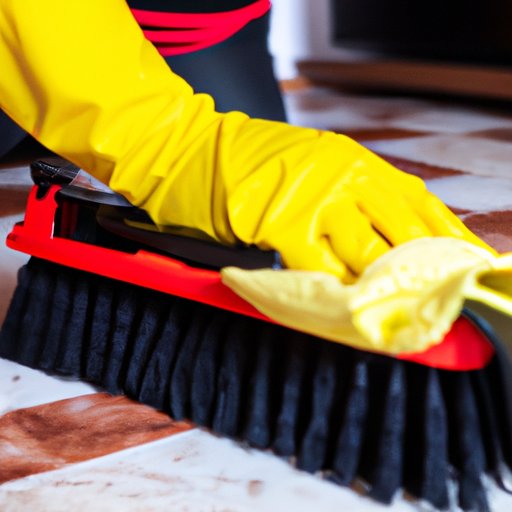
I. Introduction
If you’re a self-starter with an entrepreneurial spirit, then starting your own cleaning business could be the perfect venture for you. With the cleaning industry constantly growing and in-demand, there’s never been a better time to start a cleaning business from scratch. Starting your business on the right foot can be challenging, but we’ve put together this guide to give you the information you need to successfully launch your own cleaning business.
II. 10 Steps to Launching a Cleaning Business from Scratch
A. Conduct Thorough Market Research
To start, you need to identify if there’s enough demand for your cleaning business in your area and evaluate the competition. Take the time to talk to local business owners and residents about their cleaning needs and the company they use already. This will give you insight into the services you could be providing and ideas on how to market them.
B. Create a Business Plan
A solid business plan will help map out how your business will operate, what your goals are, and identify potential obstacles and solutions. Having a comprehensive plan will make getting your cleaning business off the ground that much easier.
C. Determine Target Audience
It’s important to identify the target market for your cleaning business. Knowing your audience will help guide your marketing efforts and focus on the services and advertising that will be most effective for you.
D. Create a Service List
Determine your service offerings and rates you will charge for them. Consider services like deep cleaning, window washing, and commercial janitorial services. Build packages that suit the various needs of your clients, but keep in mind not to overextend your offering with services that require extensive licensing and equipment costs.
E. Registration and Licensing
Register your business name and file for the required licenses and permits to operate in your area. Researching the licensing requirements for your state will save you from potential legal trouble later.
F. Choose a Business Name and Brand Image
Your brand should represent your business’s identity as well as your target audience’s desires. It should stand out in the market with something catchy and unique that will be easily remembered by clients and that will make your business easily recognizable.
G. Set Up a Pricing Structure
Your pricing should balance out industry norms with cost to client expenses. Make sure your rates fall in line with your competition while making sure you can pay yourself properly and pay for expenses like taxes, licenses and equipment.
H. Hire Staff, Contractors, or Decide to Work Alone
Once you’ve built your business, you’ll have to decide if you are going to hire contractors, or keep everything in-house. If you choose to do it all solo, your earnings will be your pure profit. If you decide to hire a staff, you will have to weigh the overhead costs against the benefits of someone who can take a lot of the workload off you.
I. Obtain Insurance and Find Commercial Cleaning Equipment and Supplies
Getting liability insurance will protect you and your clients from any mishaps that could happen during your cleaning duty. Sourcing your cleaning supplies and equipment is also a priority to ensure your cleaning is consistently high quality, giving a professional brand image.
J. Launch the Business and Continuously Monitor Growth
Many businesses rushed to launch without properly testing the market, resulting in a slow start and few clients. Take your time to test the market, promote your brand through advertising and continue to monitor your growth and adjust your prices or service offerings accordingly.
III. The Pros and Cons of Starting a Cleaning Business
A. Advantages of Starting a Cleaning Business
Starting a cleaning business has a range of great advantages such as low start-up costs, high-profit margins, flexible work hours, and the opportunity to build repeat business from clients. It also has excellent growth potential for adding locations and diversifying service offerings.
B. Disadvantages of Starting a Cleaning Business
Starting a cleaning business isn’t all sunshine and roses. It can be physically demanding, and you have to find reliable clients to stay in business. It can be challenging to keep your business abreast of current market competition and proper cleaning techniques. The monotonous, repetitive nature of cleaning can be draining over time.
C. Tips for Mitigating the Challenges
Ready to start your cleaning business despite the disadvantages? Incorporate these tips to make your business successful: adapt to change, become an industry expert, network, keep creativity alive, continuously grow, and keep a positive attitude.
IV. Funding Options for Your Cleaning Business
A. Personal Loans
Personal loans are a classic option to fund your own cleaning business while minimizing your financial risk. You are solely responsible for the loan, but these loans offer lower interest rates and lower fees than other types of financing options if your credit score is good.
B. Small Business Administration Loans
The U.S. Small Business Administration offers loans with lower interest rates and longer terms than most bank loans. SBA loans are commonly used to finance larger expenses like purchasing or leasing real estate to operate your cleaning business from.
C. Crowdfunding
Crowdfunding is a nontraditional way of funding that can help after you’ve made the jump to start your cleaning business. Crowdfunding can work by offering discounted services to those supporting your fundraiser, as well as offering up some type of business equity or recognition in the future.
D. Other Sources of Funding
Other sources of funding include securing a business line of credit, seeking out angel investors, or partnering with larger corporations for funding and mentorship opportunities.
V. Marketing Tips for a Successful Cleaning Business Launch
A. Create a Website
The majority of people use search engines to find local businesses these days. If you do not have a website, you are missing out on clients who could have easily found your services based on your location or services offered. Be informative about what your brand offers, which services you offer, and your rates and hours, for customers to have all the necessary information upfront.
B. Utilize Social Media
Social media has a massive impact on businesses as they offer free advertising to reach more customers. You can use social media channels to post updates, new services, cleaning tips, or behind-the-scenes content, depending on your brand identity.
C. Hand Out Flyers
Never underestimate the power of flyers. Handing out flyers, or leaving them in high-traffic areas, is one of the easiest ways to parlay free advertising into new business. Make sure they’re properly designed – attention-grabbing fonts, branded, with eye-catching imagery.
D. Network with Other Businesses
Becoming part of the industry and regional networking community can lead not only to new clients but also opportunities to co-promote your business and partnerships. By working together, you have an opportunity to help build one another’s brands and businesses, and in turn, build brand exposure for both of you.
E. Other Strategic Marketing Techniques
You can undertake more tactics such as paid marketing, SEO, print and media advertising, giveaways, or events to create buzz about your cleaning business. Deploy strategies that identify with your target market and test what strategies get you the most desired results.

VI. Why Investing in Professional Cleaning Equipment is Key to Success
A. The Benefits of High-Quality Cleaning Equipment
The benefits of professional, industrial-strength cleaning equipment are vast and can improve the quality of your cleaning service. High-quality equipment can handle grit, dust, and other obstructions that regular consumer equipment cannot handle. It can also reduce the time and effort it takes to complete cleanings.
B. How Investing in Professional Equipment Affects the Bottom Line
Choosing quality cleaning equipment creates a great outcome—but it also has a real effect on overhead expenses. Minimal repairs and maintenance costs will maximize the lifetime of the product, saving you money in the long run.
C. Tips for Choosing the Best Cleaning Equipment
When it comes to choosing the right equipment for your business, do your research. If you plan to do heavy-duty cleaning hours a day, it’s best to invest in industrial-strength equipment that can withstand the workload without downtime or repairs. Get expert advice from vendors and the manufacturers themselves to understand the lifetime of the product and the technology.
VII. Establishing a Cleaning Business for Specific Markets
A. Residential Cleaning
This service caters to homeowners and living spaces for non-commercial cleaning. Customizable plans and packages can greatly cater to local residents, with regular home cleanings or focused deep cleaning services. Reach out to residential clients with a more personal, customized touch.
B. Commercial Cleaning
Commercial cleaning deals with larger areas of cleaning such as office buildings, retail spaces, medical facilities, and other business-oriented fields. Commercial cleaning services require more advanced equipment and skillset, longer-term contracts, and more sophisticated management.
C. Green Cleaning
Green cleaning is the use of eco-friendly products and methods to clean homes without negatively impacting the Earth. Green cleaning development is becoming more popular among the clientele, and choosing this specialty can give your cleaning business an edge over your competition. Go green and get ahead in the business world.
D. Niche Cleaning Services
Specialty niches can consist of window cleaning, carpet cleaning, or pressure washing areas with unique maintenance. These niche fields can complement other core offerings and generate side revenue when looking for specific projects outside of regular cleaning services.
E. How to Target the Right Market Segment and Stand Out
Offer personalized cleaning services, divvy out flyers, network with business owners, establish a strong online presence, and keep up to date with industry developments. You should continually research techniques, technology, and customer needs to tailor your services to fit perfectly with your target customers.
VIII. Conclusion
A. Recap of the Main Points Covered
Starting a cleaning business can open doors to rewarding opportunities on both a professional and financial level. Establishing a business plan, budget and brand image, taking funding options seriously, and marketing your cleaning services strategically will take your business to the next level. Keep in mind fundamental industry skills, the importance of high-quality cleaning equipment, and which market segments to cater to.
B. Final Tips for Success in the Cleaning Business
To be successful in the cleaning industry means you must be on top of your game. Keep motivated, stay open, remain curious, and follow through on your promises. Continuously adapt as the industry continually changes, and ensure your customers are satisfied with every project.





